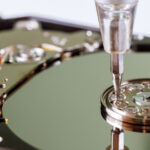At Hard Drive Repair, we see a lot of failed hard drives come across our desks. From simple logical failures to severe mechanical and physical problems, there are many ways hard drives can malfunction and stop working properly, leading to inaccessible data. In our experience, these are some of the most common causes of hard drive problems:
Physical Damage – One of the most straightforward causes of drive failure is physical damage to the hard drive mechanism. Dropping a powered hard drive, severe impact, or harsh vibrations can damage the platters, heads, motor or other internal parts, preventing the drive from spinning up or accessing data. Even damage to external housing like the USB connector or power port can render useful drives inoperable.
Bad Sectors – Bad sectors occur when areas of the hard disk platters get physically damaged or have magnetization issues, making them inaccessible to store and read data reliably. As drives age, bad sectors generally spread until large chunks of space are unusable. Extensive bad sectors cause file system corruption, freezing, and ultimate failure.
Firmware Corruption – The firmware or logic board in a hard drive coordinates all read/write operations. If the drive firmware gets buggy or corrupted, perhaps due to a failed firmware upgrade or electrical issue, even an intact mechanical system can no longer function. The drive will exhibit bizarre behaviors like disappearing data, blue screening, or getting stuck in boot cycles.
Power Surges – Power fluctuations are hard on electronics, and hard drives are no exception. From failing power supplies to storms, wiring issues, or even ungraceful computer shutdowns, power problems can fry drive controller boards or damage the delicate internals. Preventing electrical issues can significantly extend hard drive lifespan.
Understanding the root causes of different drive failure modes allows our technicians to quickly diagnose issues and attempt appropriate repair procedures before resorting to full data recovery and drive replacements when unavoidable. If you suspect your hard drive is showing signs of failure, don’t hesitate to contact our service team for assistance resuscitating it or extracting your important data.








Leave a Reply